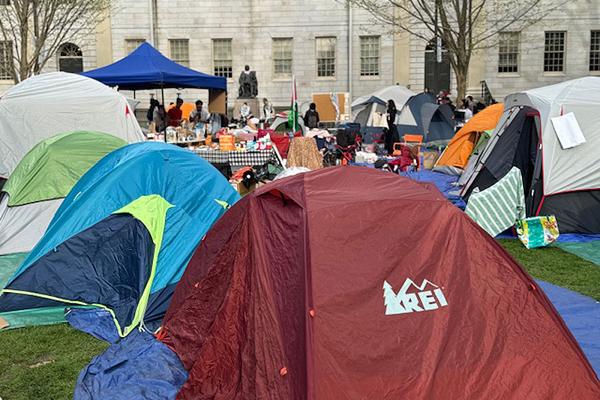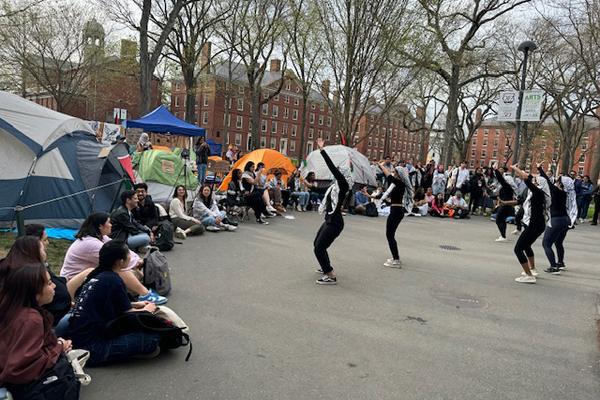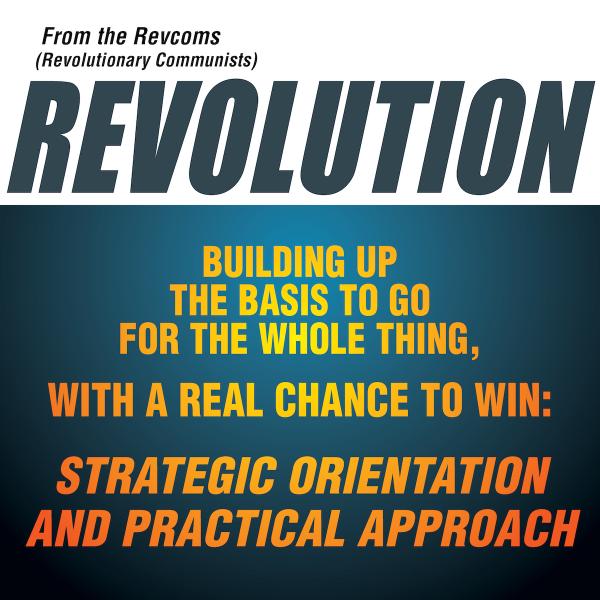
Student encampment for Palestine at Harvard University, April 24, 2024. Photo: Special to revcom.us
A fellow Revcom Corps supporter and myself went into the Harvard encampment on Saturday, April 27. Harvard Yard was on lockdown so only people who had a Harvard ID could enter. Security was tight at the famed gates to entry. My comrade and I engaged some students together, but we each got out flyers and also approached many students separately. I was quickly invited in by the students to talk.
I approached most of the students with the flyer and with these questions: “Why have you decided to come out here to join this encampment?” “Why do you think that the administrators of schools across the country are coming down in such a brutal way against the students? Why is this system so threatened by what you all are doing?” I also put to the students: “What do you think would happen if the students at all of these elite colleges lost their ‘ALLEGIANCE’ to the system of capitalism-imperialism and how it operates here and around the world?” I commended answers from some students who seemed to know something about a system at play; and I challenged others to look more deeply at what is actually going on and used the talking points in the flyer as a grounding reference. I talked about Bob Avakian, BA, and this being a rare time when revolution is possible and the only way out of this hellhole of a world. I referenced BA’s social media message number 27 and the QR codes for more information.
The first student we encountered was from the Middle East. He reported that he was no longer a student at Harvard but flew back from thousands of miles away to join the encampment. He knows that Harvard is a voice for imperialism but this newest barbarity opened his eyes even more. He connected what is happening in Gaza to imperial power and was immediately open and eager to talk to us and get the flyer. He was cautious at first and wanted to be sure that we were not from the media. He did not want to give his information but we invited him to contact us through the website if he wanted to talk more. He was the most advanced person I met in the time I was there. He felt that he had to be a part of this action because the genocide in Gaza so moved him and he had to participate in standing up against institutions, like Harvard University. Most students are brought out because of Gaza.
One student said that she thought the colleges were cracking down because the encampments were an “embarrassment” to the schools and they did not want to tarnish their images. She took in my perspective about how this represents the workings of imperialism, and she seemed compelled by my highlighting how the campus movements of the Sixties galvanized the rest of the society and was a big reason for the end of the Vietnam War. She seemed happy to grab up the flyer and to learn more about BA.
A couple of students thought the crackdown was happening because “they do not want to change the narrative.” I asked what narrative was at stake. They were stumped as to what the threat was all about. I challenged them: “POP QUIZ: what do you think would happen if all of these students at these elite colleges lost allegiance to this system?” One student gleefully retorted, “The system would fall apart!” I commended her, “YES! That is what they are afraid of! YOU get an A plus, plus!” They grabbed up the flyer as we delved deeper into the crimes of the system and the rare time for revolution.

Dancing at student encampment for Palestine at Harvard University, April 24, 2024. Photo: Special to revcom.us
Students were open and seemed happy that we were there. Tents were spread out on the lawn, and they had dance performances and a real sense of comradery. Many students wore keffiyehs [Palestinian scarves that have become a symbol of support for Palestine]. There was somewhat of a festive atmosphere with some chanting “Free Free Palestine,” and the campsite had Palestinian flags and a keffiyeh was draped around the statue of John Harvard [founder of Harvard University] sitting on his throne.
Some students thought the crackdown was due to money and the school’s large donors threatening to pull out. Some thought that the crackdown was related to schools just wanting to control their students.
I did not get the impression that many students really understood that capitalism-imperialism was at the core of what was happening at Harvard, other elite colleges, or in Gaza. There was a great deal of passion, but no real clue about how capitalism works or certainly that a revolution was needed and possible. I did not get the impression that the students had any cohesive idea about where to go from here or what goals were even achievable. “We will stay here until Harvard meets our demands to divest,” was a common theme. I did not get a sense of militancy or going up against a system that is committing huge crimes against humanity very broadly.
While we were there, Harvard University admin sent out a very threatening email to the students. One student started reading it aloud to me and others nearby. It talked about how the encampment was a violation of Harvard policies and that the “amplified sound” was “disturbing the reading period” of other students. It seemed that the students remained defiant and did not want to back down.
I felt that it was very important that myself and my comrade had the opportunity to spend time in the Harvard encampment. I was surprised and so inspired by the way we were welcomed into the space and the way the students seemed hungry for what we had to say. They grabbed up the flyers, and many were open to engagement around the content of the flyer and it seemed to wake them up to an understanding that, clearly, they do not have.
It seems glaringly clear that we, as revcoms, have an opening here. Most students were quite naïve to the fact that there is a system at play and that what they are doing can have a major impact on the whole society. There was only one student, not a part of the encampment, who was angry and yelled, “Harvard needs to get these people out of here!” Well, I guess there is one in every crowd! But overall, this experience was powerful and demonstrated a growing crack in this system, which seems ripe to be broken wide open with unity, education and struggle.
